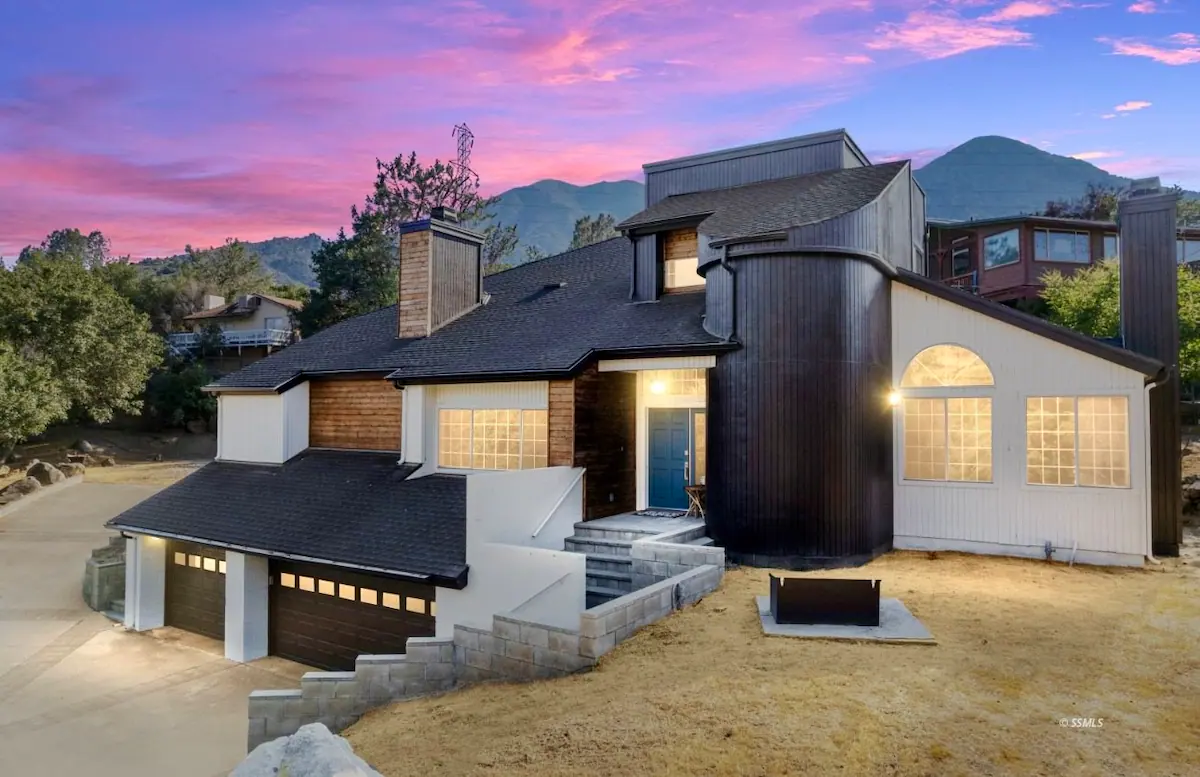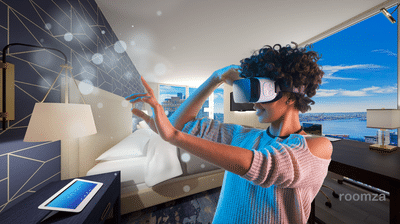How One Successful Hotel Is Thriving With a Ratio of 1.5 Staff to 24 Rooms
When they finally get checked in, they take the elevator up to their room only to find that your magnetized keycard is unresponsive. They sigh and make their way back down to the lobby with all their personal belongings and can’t find anybody to speak to in order to solve the issue without lining up at the front desk all over again.
Not an ideal start to a guest’s stay at your hotel but, chances are, in spite of all your best intentions and well-laid plans, this experience has been lived dozens (if not hundreds) of times by guests at your hotel.
To help prevent issues like this, you hire increased front desk staff, though this has a huge impact on operating costs which isn’t sustainable in the long-term.
One hotel, The Annex in Toronto, has taken a different, tech-led approach which has eliminated these types of issues entirely while actually reducing staffing costs. They’ve taken a so-called “high-tech, low-touch” approach to hotel management to the extent where they are able to efficiently run their hotel with an average of just 1.5 staff for 24 rooms.
You might think this has led to a cold, detached experience. What about the family asking for local advice? Surely they’re underserved by this model. On the contrary: Hotel Annex has found that, by eliminating the front desk entirely and choosing to embrace technology, they’ve actually boosted customer satisfaction and increased profitability.
We spoke to Ryan Killeen, their general manager, to find out how—with the help of technology partners like Operto—they were able to make this forward-looking vision a reality and how you could do the same for your hotel.
Find out how you can connect your operations.
Death of the Old Hotel Operating Model
Reducing staff and eliminating the front desk might seem like a counter-intuitive approach to enhancing customer experience and eliminating common causes of guest frustration.
Traditionally, you’d have good reason to think the solution to issues surrounding check-in experience lies in hiring increased staff for your hotel foyer. After all, in the above example, if there’d been more staff on the front desk, that would’ve immediately helped address at least one of the issues, right?
Perhaps in the short-term but there’s a good chance this strategy leaves you rearranging deck chairs on the Titanic. It’s a temporary fix to a systemic issue.
Not only is this old model of hotel operation unsustainable from a budgetary point of view, but as the hospitality industry recovers from the impact of the pandemic there are added health and safety concerns to consider. Many of the social distancing and cleanliness standards brought about by the pandemic can safely be expected to stay with us into the foreseeable future.
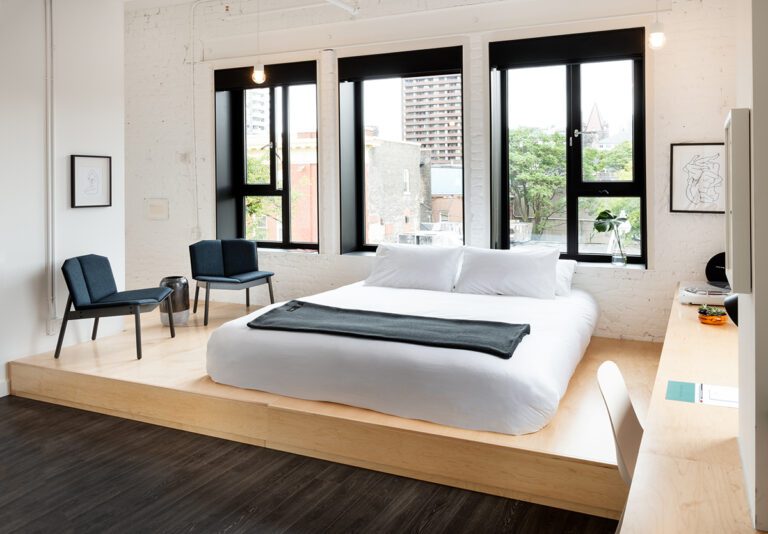
Plus, there are certain types of people, including younger demographics and business travelers, who prefer keeping unnecessary social interactions to a minimum. When given the option, people increasingly opt for contactless transactions, now the norm at places like the supermarket, movie theater, and airport—one study showing 73% of people in the US favor self-service technology and reduced interaction with staff.
But, if the old model of the hotel foyer packed with staff is no longer fit for purpose, then how do you go about transitioning your hotel to a contactless future? It requires a bit of innovation.
The amount this has saved the hotel on dedicated front desk staff is considerable. If you consider for a moment that front desk would have cost the hotel at least the Toronto minimum wage of $14 per hour, and apply that to a 24-hour front desk with one staff member operating 365 days of a calendar year, the cost comes to just over $122,000. Factor in additional front desk staff and this multiplies further. If you’re paying more than minimum wage and have the average, 24-room, $90 ADR, these cost savings are significant.
Furthermore, they’ve even been able to house frontline workers during the height of the pandemic—in no small part thanks to their smart adoption of technology seeing them recognized as a safe and sanitary option.
Leading the way
What is The Annex?
Since its inception in 2018, The Annex was set up to be a next-generation hotel: high-tech, low-touch. Named after the cool Toronto University-adjacent neighborhood where they’re located, they host a wide-ranging demographic of guests. This includes young international travelers who enjoy the flexibility and modernity on offer as well as business travelers who welcome the level of comfort and convenience at the end of a busy day.
In addition to having their own Airbnb units, the three owners have varying backgrounds; from private finance, start-ups, tech, and real estate. Prior to launch, they saw an opportunity to bring an offering to Toronto that simply didn’t exist.
From the beginning, they understood that to best serve their customers in a vibrant, educated area of Toronto they would need to differentiate themselves from the typical experience and embrace new ways of doing things. There’s now a lot of talk about contactless guest stays, but The Annex was way ahead of the curve.
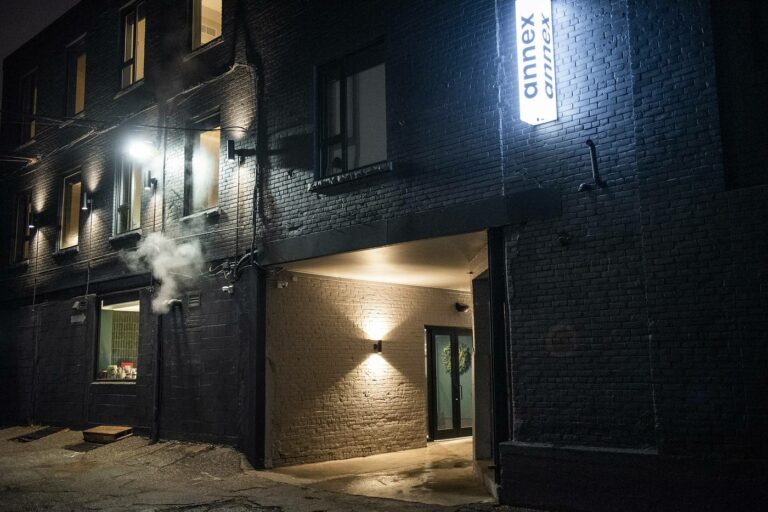
“By removing the front desk and connecting directly to guests through their phones, it gives us a greater ability to interact between the guest and our team,” says Ryan Killeen, general manager at the hotel. “With remote check-in, a guest can show up at the hotel and head straight to their room. It just makes sense; showing up to a hotel these days and waiting in line at a front desk seems like a very unnecessary process.”
Being contactless, even back in 2018, was central to the entire concept; The Annex was envisioned as a hotel for the future. The high-tech, low-touch experience makes even more sense in light of the pandemic and the challenges it presents hotels, in terms of the health and safety of guests and staff members—eliminating the front desk in favor of smartphone interactions.
It’s something Killeen is justly proud of, especially since it enabled the hotel to assist frontline workers in Toronto during the height of the pandemic when they hosted ‘Heroes in our Hotel’. He credits being tech-driven with making it possible for enabling the hotel to become a shining pillar of the community and beacon of local pride.
“It was very well-received. Guests didn’t have to worry about keys or bringing them to work or anything like that. When they showed up to The Annex, whether after their shift or on their days off, they knew it was going to be a seamless experience getting in and out,” he says. “They were all self-isolating to keep those around them safe. Staying at The Annex gave them somewhere they could come back to which was safe and comfortable.”
– RYAN KILLEEN
The Annex General Manager
How are they different?
The Annex utilizes technology in a lot of ways but the most obviously apparent is the lack of a traditional hotel foyer or hotel foyer staff. Guests are sent an access code for their rooms to their mobile devices. This code is altered remotely after check-out to give an additional benefit in terms of increased security.
This could seem cold and lacking in the human touch but they actually leverage the fact that all their guests are connected via mobile to enhance the customer care experience. Guests are in direct text contact with staff 24/7 through their phones, able to get advice about the city or ask questions about their stay conveniently without having to leave their room or pick up a phone and speak to a traditional reception.
The Annex, without a traditional front desk, has paradoxically got its guests better connected to its staff than those at more traditional hotels. An attentive staff member is only ever an instant message away.
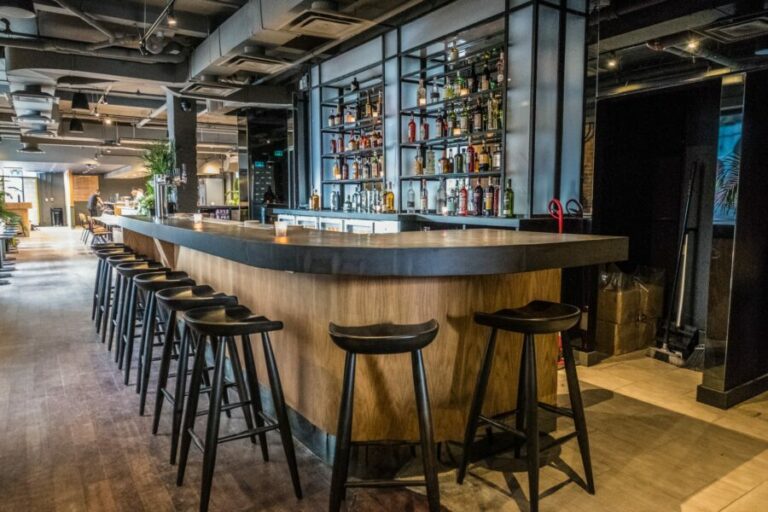
Not requiring a phone in each guest’s room is an additional benefit, along with replacing expensive TVs and cable TV subscriptions with iPads and Netflix. These changes go hand-in-hand with The Annex’s modern brand and high-tech ethos, while also further reducing operating costs for the hotel.
In keeping with this approach, they don’t have an on-site gym, but they do have a partnership with a local one that grants their guests access and is only a 5-minute walk down the block. They also advise guests to use local, affordable city parking.
As Killeen explained to us, they didn’t set out to design the anti-hotel, but the owners quickly realized there was so much that seemed unnecessary about the old model and, by smartly implementing technology, they’ve been able to reduce costs and increase profitability.
In an era when many hotels pay out more than 30% of their revenue on staffing costs (with some estimating the figure as high as 50%), and as cities and countries increasingly adopt new legislation to drive up the wages of hotel staff, the material benefits of this approach should be clear.
What does it mean to be a tech-enabled hotel?
There are a lot of options out there today for the hotelier interested in innovating like The Annex. For instance, a move to ditch the old front desk and embrace the digital future can include more than just contactless check-in. A wider adoption of this strategy can include remote guest room energy control and real-time noise monitoring—additions which can also help to further mitigate costs, increase security, and improve guest experience.
For The Annex, the focus has been on eliminating unnecessary human interactions.
But can this take humanity out of guest experience?
Perhaps this approach makes the hotel a cold and unwelcoming place to stay?
But this isn’t the case—in fact, they’ve found the opposite to be true.
“Technology allows our team to focus on the hospitality aspect, going above and beyond for our guests, using tech to enhance the experience,” says Killeen. “The guest has a smartphone in hand and is able to receive suggestions for the night ahead or perhaps get a message saying ‘Hey, how are you? Would love for you to join us in the morning for coffee! Tech can really personalize the interaction without it feeling fabricated. It’s not something where people have to endure the hassle of learning something new or just being a nuisance. In our view, we want The Annex to be a home away from home for our guests. We want them to feel like they are interacting with us as locals who are giving real local suggestions for their stay.”
Being fully tech-enabled is the future of hospitality, says Killeen: “Today everyone is on their smart devices and it really makes sense for that channel to be how you communicate access, how you interact with guest requests and allow them to discover something new.”
At The Annex, all touchpoints in the hotel are enabled by technology, while still giving guests the feeling that staff are available 24/7. They’re a great example of how the most innovative hotels are using technology to enhance the experience and ensure long-term success.
How they made the change
The success of The Annex is down to the hotel’s forward-thinking owners, and the hard work of people like Killeen who remain vital to the running of any hotel. But a key piece of the puzzle for them has been working with Operto as a valued technology partner.
“Operto has been fantastic for the hotel. When guests arrive all they have to do is place their palm over a keypad and enter a code and they’re given access to the room,” says Killeen. “This is far smoother than the ‘old school’ room keys! It’s always fun to watch people when they first realize how simple it is.”
Specifically, The Annex has adopted Operto Connect to not only exchange losable, breakable (and stealable) keys and cards for keypads, but for a whole load of other benefits which complement the hotel in creating a perfect guest experience.
Connect takes your guest’s booking through your PMS and connects it to everything else your hotel has to offer, including in-app access to additional purchases (including snacks and room service), as well as enabling convenient access to things like late check-out. And when it comes to check-out, that’s also as easy as using the keypad which will then create a new entry code for your housekeeping staff.
Through Connect, guests can receive automated welcome messages upon entering their rooms, including all necessary information for their stay (such as Wi-Fi passwords). They can also get control of the heating or air conditioning through the guest app.
An additional cost-saving benefit here is that the hotelier can also use this feature to ensure guest rooms are not running up huge energy bills while the room is unoccupied. Hotels can also take advantage of noise monitoring technology in each room to ensure guest safety and comfort further.
“Using Operto has also allowed us to operate extremely efficiently as the access is essentially taken care of. All we do is provide that information to our guests through their phones; it really modernizes the check-in experience. It’s also fantastic from a back-end standpoint with things like housekeeping and access to room data for more efficient operations.”
Using Operto Connect can also greatly benefit your staff through use of the team portal which can provide individual staff members with personalized schedules which take into account real-time information about guest check-out, among other things, to increase efficiency.
“We’re able to operate a 24 room hotel with essentially one person on-site facilitating everything. That’s been fantastic. It’s very efficient and software solutions like Operto make that possible.”
Like every other industry on the planet, the future of the hotel industry is wedded to technology and the winners and losers will be defined by how best they integrated that technology while maintaining a high-quality guest experience. Annex has demonstrated one path forward, which involves eliminating the staffed foyer and bringing an intimate customer care experience to mobile, delivering increased profits and drastically reducing cost.
More Articles
Where’s the friction in your guest journey?

